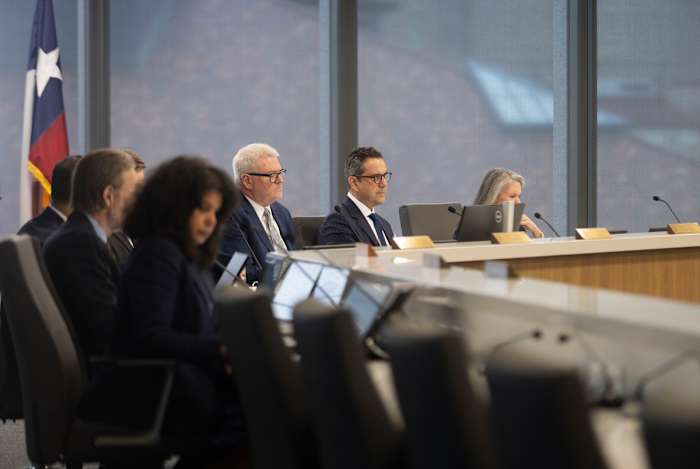Sign up for The Brief, The Texas Tribune’s daily newsletter that keeps readers up to speed on the most essential Texas news.
The Texas House on Monday voted to abolish the Texas Lottery Commission and transfer the state’s game to another agency after a last-ditch effort to kill the game entirely failed.
The fate of the 32-year-old lottery commission had been in limbo, as a routine state review requiring legislation to extend the game’s existence had come concurrently with some lawmakers’ calls to shut down the lottery entirely over allegations of wrongdoing.
An alternative was presented earlier this month in an unusual late-session filing of Senate Bill 3070: let the Texas Lottery Commission die, and transfer game operations, including charitable bingo operations, to the Texas Department of Licensing and Regulation. The bill is now likely the lottery’s only way forward, as neither of the two “sunset” bills continuing the commission have been touched by lawmakers for months.
Beyond the agency move, SB 3070 contains several other lottery regulations also proposed in other bills this session. Those new restrictions include a new ban on online lottery ticket sales with language almost identical to one of Lt. Gov. Dan Patrick’s legislative priorities, Senate Bill 28. It also sidesteps the lottery’s final hurdle, its loss of funding after the House removed it from its next biennial budget proposal in April. That money would have needed to be returned to allow the agency to continue.
Rep. Charlie Geren proposed a new 60-page version of the bill from the House floor Sunday, fine-tuning some of the proposed investigative tools the new lottery department would have to root out illegal sales.
SB 3070 also contains a provision requiring the Sunset Advisory Commission to review the lottery’s operations under its new agency before 2029 to determine whether it should continue. That deadline was originally in 2027 when the bill passed through the Senate unanimously on May 15, which Patrick described as a “two-year lease on life” for the game.
Before ultimately OK’ing the bill 110-29 on Sunday, House members struck down a proposal to end the lottery altogether, as Rep. Brent Money, R-Greenville, introduced an amendment to Geren’s bill that would have abolished the game in September. That amendment failed 71-58. Money called the lottery the “most regressive tax” in Texas, and his supporters claimed the game unfairly preys on the poor and could not be run fairly in any capacity.
“The problem is, as a legislature, if we know an agency is corrupt, shouldn’t we just abolish it?” Rep. Nate Schatzline, R-Fort Worth said during floor discussion on Sunday.
The lottery has received significant criticism from lawmakers over two jackpots won under circumstances they say epitomize the commission’s failure to oversee the game safely. In the first, a single group in April 2023 printed 99% of the 25.8 million possible ticket combinations — called a “bulk purchase” — winning a $95 million jackpot. In another February win, a Texas woman bought the winning ticket, worth $83.5 million, through an online app known as a lottery courier.
First reported by the Houston Chronicle, the “bulk purchase” received national coverage after it was revealed that millions of tickets were printed at four different locations on dozens of lottery terminals provided specifically for the mass-ticket effort. A lottery courier was also involved in the bulk purchase, which comprised 99% of the 26 million possible ticket combinations for the jackpot, but did not sell the tickets through its online service.
Couriers, who had been operating in Texas by printing physical tickets at retail stores they owned before scanning and sending digital copies to customers, would be banned under SB 3070’s online ticket sale restrictions. The online services’ operations became another point of contention between the lottery commission and lawmakers after the agency passed its own ban on couriers after it maintained for years it could not regulate them. That rule is currently being contested in court by a national courier company, Lotto.com.
The lottery commission’s likely dissolution is just one part of the fallout from the controversial jackpots and concerns over couriers. A commissioner with the lottery resigned in February, followed by its executive director in April. The $83.5 million win has yet to be paid out, as Attorney General Ken Paxton and the Texas Rangers, a division of the Department of Public Safety, are still investigating both jackpots for potential illegal activity. The anonymous woman filed a lawsuit last week seeking to force the lottery commission to release her winnings.
SB 3070 requires Senate approval of the House’s changes before heading to Gov. Greg Abbott. The governor has largely remained silent on the lottery’s fate outside of ordering the Texas Rangers to launch an investigation in February. The bill would take effect immediately if signed, as it received more than two-thirds majority vote in the House and a unanimous vote in the Senate.
First round of TribFest speakers announced! Pulitzer Prize-winning columnist Maureen Dowd; U.S. Rep. Tony Gonzales, R-San Antonio; Fort Worth Mayor Mattie Parker; U.S. Sen. Adam Schiff, D-California; and U.S. Rep. Jasmine Crockett, D-Dallas are taking the stage Nov. 13–15 in Austin. Get your tickets today!


